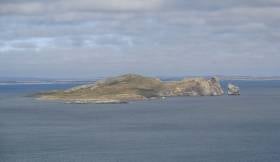Displaying items by tag: Greater Dublin Drainage
Marine Notice: Benthic Survey for Greater Dublin Drainage Project
The Department of Transport has been advised by Uisce Éireann (formerly Irish Water) that it will carry out a benthic survey from Wednesday 20 to Friday 22 September, subject to weather and operational constraints.
The survey will take place in the vicinity of the proposed Greater Dublin Drainage (GDD) outfall route and diffuser location, east of Portmarnock Beach and north of Ireland’s Eye.
Survey operations will be undertaken at eight sampling locations using the local work vessel Ros Áine (callsign EIZG5). The vessel will mobilise the scientific equipment from Howth and will operate onsite daily during daylight hours only.
Each sample site will be subjected to a seabed investigation where a sampler or dropdown camera will be in momentary contact with the seabed. Neither the equipment nor the vessel will be anchored to the seabed at any time.
The work vessel will display appropriate shapes and lights during operations and can be contacted via VHF Channel 16. All other marine traffic is requested to maintain a wide berth whilst operations are under way.
Coordinates and a map of the survey areas as well as contact details can be found in Marine Notice No 56 of 2023, attached below.
Planning Hearing On Clonshaugh Wastewater Plant Gets Under Way
Planners are from today set to review proposals for a controversial €500 million wastewater treatment scheme in North Dublin, as The Irish Times reports.
Clonshaugh near Dublin Airport was chosen in June 2013 as the site for the sewage ‘super plant’ before Irish Water took over the Greater Dublin Drainage project from Fingal County Council last year.
The new plant — second only to the Ringsend wastewater facility in scope — would be connected to a new orbital sewer to Blanchardstown, and an outfall pipe to eject treated wastewater in the sea north of Ireland’s Eye.
Plans for the new sewage processing plant have faced strong local opposition, both from residents adjacent to the Clonshaugh site and connected works and marine professionals concerned about potential environmental risks.
Last October, Howth-based ferryman Ken Doyle expressed his fears of the knock-on effect on fish stocks from any accidental contamination of the local waters from the outfall pipe.
The planning hearing began at The Gresham hotel in Dublin this morning, and The Irish Times has more on the story HERE.
Health Minister Speaks Out Against Fingal Sewerage 'Super Plant'
#NEWS UPDATE - The Minister for Health has raised concerns over a new water treatment 'super plant' planned for Fingal, amid fears that a malfunction could see huge amounts of raw sewerage pumped into the Irish Sea.
As reported in The Irish Times, Dr James Reilly echoed worries expressed by his north Dublin constituents and members of community group Reclaim Fingal Alliance, noting that the people of Skerries, Loughshinny and Rush are particularly "worried about the effects of the outfall pipe in their area".
The minister said that none of the nine sites being considered by Fingal County Council and Greater Dublin Drainage was suitable for sewerage treatment, and that any waste should be treated to "advanced levels" to make the outfall as clean as possible, thereby avoiding adverse impact on shellfish beds.
As many as 10,000 letters of objection have been lodged against the plan by campaigners including local farmers and environmentalists.
The Irish Times has more on the story HERE.

























































